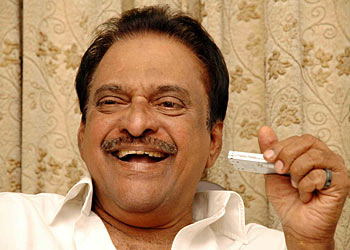
The most anticipated film in Malayalam, Hariharan's Pazhassi Raja will finally reach the theatres on October 16.
The uniqueness of the film is that all the major people associated with the film are award winners. Writer MT Vasudevan Nair is a Jnanapith award winner, Mammootty is a three time National Award winner, Resool Pookutty, the sound designer is an Oscar winner, and director Hariharan is a National Award winner (for Parinayam).
Hariharan who joined the Malayalam film industry in 1964 and made his first film in 1972, speaks exclusively to rediff.com's Shobha Warrier a day before the release of the film.
There is a lot of hype, expectation and curiosity about Pazhassi Raja...
It is unprecedented. In my entire career as a director starting from 1972, I have not had such a response to a film of mine. Wherever I go, people, even those who are in their 70s and 80s ask me about the release of the film as it has been in the making for almost two years. Even young people enquire about the film.
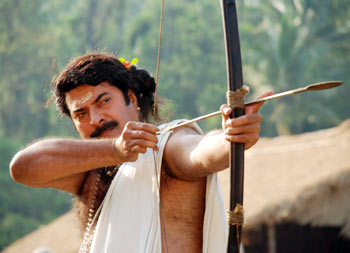
Is it because of Oru Vadakkan Veera Gadha in which the same combination worked?
Not only that, there is something about the film that has kindled the curiosity of people of all generations. Everybody knows that this is the story of a freedom fighter.
I have found that the youth is fed up with the same kind of films with the same kind of mass drill and same kind of stunts that come to the theatres every week. How long can they watch actors and actresses jumping up and down?
It is there in all the languages in India. In fact, there is no difference between a Tamil or a Malayalam or a Telugu or a Hindi film; all you see are group dances! In such a scenario, is there any surprise that people look forward to Pazhassi Raja, the story of a warrior with patriotism, action, drama and emotion.
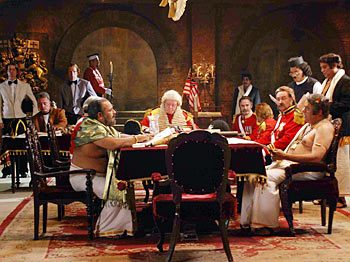
As a filmmaker, are the expectations from the public giving you anxious moments?
I am not anxious; I am thrilled at the way the audience is waiting for the film. I must tell you I am confident of the product.
If you look at the kind of films MT and myself have given to people earlier -- Amrutham Gamaya, Panchagni, Oru Vadakkan Veera Gadha, etc we have never given what people want. Many filmmakers say they give what the audience wants.
Advertisements scream that the film has all that people want. As you know, a writer like MT will never write scripts adding ingredients that people want. For him, it is a creative process. You know MT has the magic to bring the audience to the theatres. Our combination has never gone behind any trend. So, people know what to expect from us.
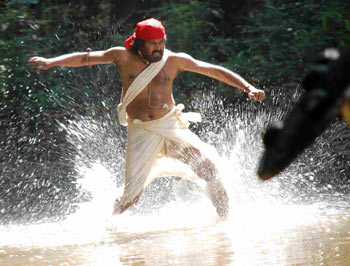
What was the beginning of the film Pazhassi Raja? Why did you decide to make a film on Pazhassi Raja, the king?
Would you believe, even before we made Oru Vadakkan Veera Gadha, MT spoke about Pazhassi Raja, and we wanted to make the film. That was the time the film 1921 started shooting. That was also based on the Indian freedom struggle. So, we decided to make some other period film, and MT suggested the story of Chandu.
But MT used to say he didn't know why, but this king never got the kind of recognition he deserved. He wanted to write the story for posterity as he felt such a person needed to be mentioned in the history of India's freedom struggle.
We needed a producer who could make a film of such gigantic proportions. That was when producer Gokulam Gopalan came with an idea to make a film based on Vadakakkan Paattukal (folklore) but then MT said, he had already written about Chandu and was not interested in writing again.
MT suggested that he make a film on Pazhassi Raja. He also told him that he didn't know anything about the cost or any such aspect but it could be a major film in India as it was a chapter in the history of India. That was two years ago.
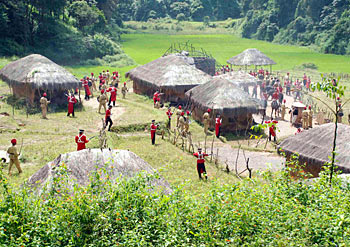
Not much is known about King Pazhassi Raja actually...
Yes, it is true. That is precisely why we are making the film. When he did not like his farmers paying extra tax to the British, they wanted to take him into custody. Even when they destroyed his palace, they could not catch him. By then, he had escaped to the jungles of Wayanad where he organised the tribals and fought against them.
When the British saw his strength, they reached a compromise. When they reneged on the conditions, he fought against them again. To catch him, the British created a camp at Panamaram Kotta but Pazhassi Raja destroyed the fort with the help of the tribals. The British caught the tribal leader Thalakkal Chandu and hanged him.
Later Pazhassi Raja also died fighting the British but the British honoured him later for bravery. The man who fought against the king wrote, 'he was our enemy but he was a great warrior. We gave him a great funeral because he deserved it'. Thus goes the story.
Why did you decide to have Mammootty as Pazhassi Raja? What is it about him that made you take the decision?
I felt nobody else could do the role like him. We considered his physique, age, talent and screen presence. When the story takes place, Pazhassi Raja is a man in his early fifties, so age also was on his side.
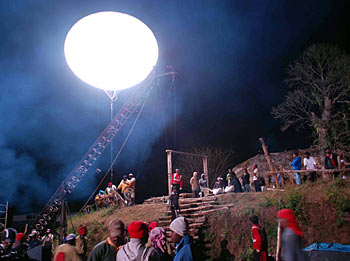
Why did you think of Sarath Kumar, a Tamil actor to act as the Commander?
It was his physique and presence that made us choose him. We did not think of language at all. We felt that Sarath Kumar suited the role very well.
What were the preparations?
It was a tough task to locate the places where we had to shoot. It took us months to do it. It was even tougher to shoot. We shot in the same jungle near Kannur where Pazhassi Raja hid from the British. Not only poisonous snakes, even wild animals were there in the forest.
It was also tough doing all the research on the background material. But they are available on the net, fortunately. We spent 5-6 months doing the preparations. We even finished shooting nine months ago.
Re-recording was done in Budapest. Ilayaraja wanted it there with the symphony. Various cultures had to be shown through music, and it had to be authentic.
Is this the most satisfying film of your carer spanning several decades?
Yes, definitely the most satisfying. I will not say it cannot be more. It can be more.
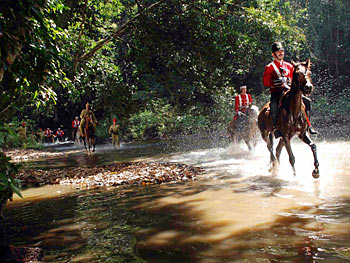
Why did you decide to have Mohanlal, Kamal Haasan and Shah Rukh Khan to narrate the prologue? Is it an added attraction?
Yes, it is an added attraction. We also wanted to include all of them in this venture.
In the case of Shah Rukh Khan, though I know him, I asked Ravi K Chandran to fix a meeting with him so that I could tell him about the film. Apparently, he said, there was no need of any meeting to just tell him this, and that he was only glad to be a part of such a film as his forefathers were freedom fighters. He also wanted to see the film. I was really surprised at his enthusiasm.
Is it because you felt that people of other languages also should see the film that you decided to dub it in other Indian languages too?
Don't look at this as a Malayalam film. Actually, this is not a film that should be taken in Malayalam. Only after we got ready, did we realise the size of the canvas and the grandeur. This story is suited for Hollywood or at least Hindi, and not Malayalam. We don't have people who have the expertise a make a film of these proportions.
Our history talks about Sepoy Mutiny as the first struggle against the British but here is a king who fought bravely against the British 50 years before the Sepoy Mutiny.
I want to say that when filmmakers are making films by copying DVDs from Hollywood, here is a film that is rooted to our soil. I am confident that audience will love an original film and not a copy from Hollywood.
This is an Indian film. I would say this is a film Kerala dedicates to the country.